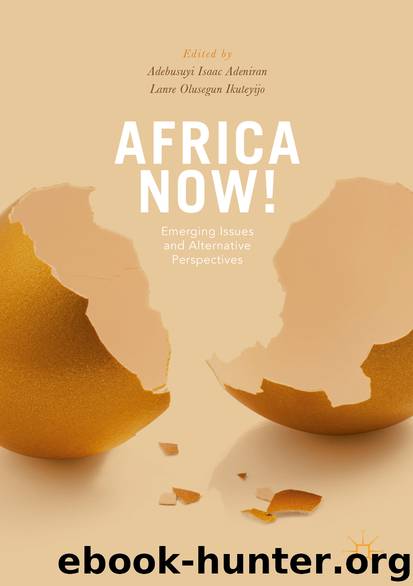Africa Now! by Adebusuyi Adeniran & Lanre Ikuteyijo

Author:Adebusuyi Adeniran & Lanre Ikuteyijo
Language: eng
Format: epub
Publisher: Springer International Publishing, Cham
Corruption
Within the disciplinary bounds of social sciences, the concept of corruption, like other concepts, has not been free from definitional disputations. The etymology of ‘corruption’ is derivable from Latin word ‘corrumpo’, which means ‘I break’ (Oladele 2004). Corruption is an encompassing word which stands not only for institutional decadence but also includes moral and personal decadence such as bribery, favouritism, nepotism, cheating, sexual gratification and other unfair means adopted by any individual to extract some socially and legally prohibited favour (Dwivendi 1967; Akinbowale 2000). The famous international organisation on issues of public corruption, Transparency International, sees it as the misuse of entrusted power for private gain. The World Bank and its agencies describe corruption as the abuse of public office by a person or group of persons for private gain.
In the same vein, Lipset and Lenz (2000) have described corruption as the ‘effort to secure wealth or power through illegal means—private gain at public expense, or a misuse of public power for private benefit’ (p. 4). Because of the massive involvement of public office holders and their cronies in corruption, it has been described by Nje (cited in Ogoma 2014) as behaviour which deviates from the formal duties of a public role. It is a behaviour which violates the rules against the exercise of certain types of action for private gain, in particular regarding influence (Ogoma 2014). Elsewhere, the word connotes the lowering of one’s integrity in the performance of a duty, especially in relation to the state or state-owned enterprises. It involves the act of an official or member of the judiciary who unlawfully uses his/her station or quality to procure some good for himself/herself or for another person, contrary to duty and the freedom of others. Perhaps indisputable is the fact that corruption, like any other social deviance or crime, necessarily involves a violation of some existing order or norm. Out of the numerous socio-economic and political ills and challenges that successive administrations have encountered in Nigeria’s fourth republic , corruption seems to attract the greatest attention and concern (Yagboyaju 2010). This has probably grown out of Obasanjo’s (cited in Yagboyaju 2010) classical conceptualisation of corruption in Nigeria as:The greatness single bane of (the Nigerian) society today will be tackled head-on at all levels. Corruption is incipient in all human societies and in most activities. But it must not be condoned. This is why laws are made and enforced to check corruption, so that society would survive and develop in an orderly, reasonable and predictable way. No society can achieve anything near its full potential if it allows corruption to become the full-blown cancer it has become in Nigeria. (p. 5)
Download
This site does not store any files on its server. We only index and link to content provided by other sites. Please contact the content providers to delete copyright contents if any and email us, we'll remove relevant links or contents immediately.
International Integration of the Brazilian Economy by Elias C. Grivoyannis(110081)
The Radium Girls by Kate Moore(12018)
Turbulence by E. J. Noyes(8040)
Nudge - Improving Decisions about Health, Wealth, and Happiness by Thaler Sunstein(7692)
The Black Swan by Nassim Nicholas Taleb(7107)
Rich Dad Poor Dad by Robert T. Kiyosaki(6612)
Pioneering Portfolio Management by David F. Swensen(6288)
Man-made Catastrophes and Risk Information Concealment by Dmitry Chernov & Didier Sornette(6005)
Zero to One by Peter Thiel(5786)
Secrecy World by Jake Bernstein(4741)
Millionaire: The Philanderer, Gambler, and Duelist Who Invented Modern Finance by Janet Gleeson(4465)
The Age of Surveillance Capitalism by Shoshana Zuboff(4275)
Skin in the Game by Nassim Nicholas Taleb(4239)
The Money Culture by Michael Lewis(4198)
Bullshit Jobs by David Graeber(4179)
Skin in the Game: Hidden Asymmetries in Daily Life by Nassim Nicholas Taleb(3989)
The Dhandho Investor by Mohnish Pabrai(3759)
The Wisdom of Finance by Mihir Desai(3735)
Blockchain Basics by Daniel Drescher(3574)
